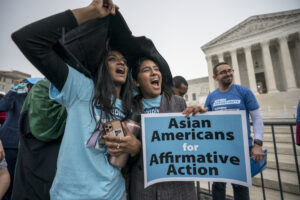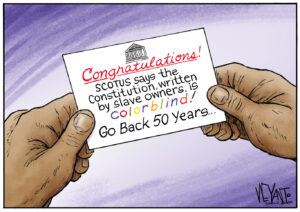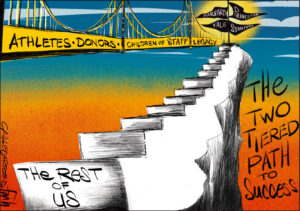Fear of a ‘Multicultural’ Nation
Fear that America is becoming overrun and unsafe because of people of color undoubtedly stems in part from media-generated images, but a fear of the other also is a big factor.Tom Tancredo's tea party rant speaks to a cultural fear that America is becoming overrun and unsafe because of people of color.
Last Thursday night former Congressman and 2008 Republican presidential candidate Tom Tancredo made opening-night remarks at the inaugural National Tea Party Convention in Nashville. Tancredo fired verbal shots at Barack Obama, Sen. John McCain and “the cult of multiculturalism,” stating that people who “could not spell the word vote or say it in English” had elected the president. And that Obama’s election reveals the need for us to “have a civics [or] literacy test before people can vote in this country.”
Tancredo is wrong. United States political history reveals our long-standing tradition in this area. In “Before the Mayflower,” Lerone Bennett Jr. recounts how literacy tests were first employed at the federal level as part of the immigration process in 1917. Southern state legislatures adopted literacy tests once African-Americans were granted citizenship rights under the 15th Amendment, as part of the voter registration process. As practiced, the literacy test became notorious for denying suffrage to African-Americans. Adopted by a number of Southern states, the tests were applied in a patently unfair manner and were used, along with the poll tax, to disfranchise many literate Southern blacks while allowing many illiterate Southern whites to vote.
The literacy test — combined with other discriminatory practices that kept African-Americans from attending schools, from particular modes of transportation, from attaining mortgages and from careers in public service — effectively disfranchised the vast majority of people of color in the South from the 1890s until after the middle of the 20th century. Southern states abandoned the literacy test only when forced to by federal legislation in the 1960s. This legalized discrimination caused suffering and turmoil for all parties involved, especially during the slavery period and the Jim and Jane Crow segregation era. Tancredo’s call for the return of literacy and civics tests suggests that those (black and brown) who voted for Obama are incapable of making informed political decisions and are influenced primarily by identity politics. Moreover, it denies the fact that the majority of voters who elected Obama were white.
Then there’s the issue of affirmative action. Like many other reactionary politicians, Tancredo has fallen victim to the misperception that affirmative action policies have done away with institutional racism and moved society beyond equal access to opportunity and into an era of “reverse racism” and discrimination. This has resulted in anti-affirmative action legislation such as California’s Proposition 209, Washington’s Initiative 200 and Ward Connerly’s various racial privacy initiatives.
During the presidential campaign, Obama responded to this issue in his “A More Perfect Union” speech when he stated: “… we’ve heard the implication that my candidacy is somehow an exercise in affirmative action; that it’s based solely on the desire of wide-eyed liberals to purchase racial reconciliation on the cheap.” This misperception that Obama is an unqualified leader who benefited unreasonably from such legislation allows many to assert that a heightened focus on diversity is tantamount to a case of the emperor’s new clothes. Also wrong. Statistics on affirmative action show that white women, such as Tea Party Convention keynote speaker Sarah Palin, have been its greatest beneficiaries, while unemployment rates for African-Americans and Latinos, 15.7 percent and 13.1 percent respectively, rival those experienced by these groups during the Great Depression.
Finally, there’s the issue of fear. 2010 Census projections indicate that by the year 2050 white people will be a minority in the United States. A lot of this has to do with immigration, which might have provided the impetus for Tancredo’s cry: “This is our country. Let’s take it back.” Fear that America is becoming overrun and unsafe because of people of color undoubtedly stems in part from media-generated images, but a fear of the other also is a big factor.
U.S. immigration history notwithstanding, there’s more for him to fear than immigration. Even without any immigration, minorities would still constitute a majority of the population under the age of 5 by 2050. According to The New York Times, this is because of higher birth rates among Hispanic people already living in the U.S. “If immigration continues, black, Hispanic and Asian children will become a majority of young children sometime between 2019 and 2023, according to the latest projections.” Moreover, interracial marriages between Asian women and white men are on the rise. What does this mean? Should minority status be extended to white Americans when this shift occurs? Should white people be preparing now? Tancredo obviously says yes, and that white minority status needs protecting against “the cult of multiculturalism.”
Beneath this fiery rhetoric, Tancredo is calling for tea partiers to retain the twin social privileges of being in the company of people like themselves while avoiding spending time with people they’ve been trained to mistrust. These social privileges are, of course, only corollaries to the tea party’s more blatant call to retain economic interests that, according to UCLA law professor Cheryl I. Harris, the law has established and protected through its construction of white identity. In her article “Whiteness as Property,” Harris explains that the legal construction of whiteness defined and affirmed who is white, what benefits and privileges whites enjoy and what entitlements to property arise from their status. Harris’ work reminds us that we must pay attention to claims like Tancredo’s because they show how whiteness can be used strategically as identity, status and property depending on situation and goal. Here’s a quick translation of Tancredo’s message: Privilege needs protecting.
Whether one is infuriated or inspired by Tancredo’s race-baiting, it’s important to recognize that there is much at stake for those who wish to maintain the status quo and much at stake for those who are trying to change it. One thing’s sure: Tancredo was right when he said that “the race for America is on right now.”
Your support matters…Independent journalism is under threat and overshadowed by heavily funded mainstream media.
You can help level the playing field. Become a member.
Your tax-deductible contribution keeps us digging beneath the headlines to give you thought-provoking, investigative reporting and analysis that unearths what's really happening- without compromise.
Give today to support our courageous, independent journalists.






You need to be a supporter to comment.
There are currently no responses to this article.
Be the first to respond.